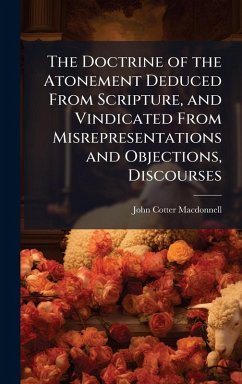
The Doctrine of Annihilation in the Light of the Gospel of Love
Versandkostenfrei!
Versandfertig in über 4 Wochen
29,99 €
inkl. MwSt.
Weitere Ausgaben:

PAYBACK Punkte
15 °P sammeln!
The Doctrine of Annihilation in the Light of the Gospel of Love, by James Baldwin Brown, explores the theological concept of annihilationism, the belief that the wicked are ultimately destroyed rather than suffering eternal torment in hell. Brown argues against the traditional view of eternal conscious torment, presenting a case for conditional immortality based on biblical interpretation and ethical considerations. This book delves into the scriptures, examining passages often cited in support of both sides of the debate. Brown emphasizes the importance of interpreting scripture through the l...
The Doctrine of Annihilation in the Light of the Gospel of Love, by James Baldwin Brown, explores the theological concept of annihilationism, the belief that the wicked are ultimately destroyed rather than suffering eternal torment in hell. Brown argues against the traditional view of eternal conscious torment, presenting a case for conditional immortality based on biblical interpretation and ethical considerations. This book delves into the scriptures, examining passages often cited in support of both sides of the debate. Brown emphasizes the importance of interpreting scripture through the lens of love, suggesting that a doctrine of annihilation aligns more closely with the gospel's message of redemption and justice. His work offers a thoughtful and compassionate perspective on a complex and often controversial theological topic. It remains relevant for those interested in eschatology, soteriology, and alternative views on the nature of hell. This work has been selected by scholars as being culturally important, and is part of the knowledge base of civilization as we know it. This work was reproduced from the original artifact, and remains as true to the original work as possible. Therefore, you will see the original copyright references, library stamps (as most of these works have been housed in our most important libraries around the world), and other notations in the work. This work is in the public domain in the United States of America, and possibly other nations. Within the United States, you may freely copy and distribute this work, as no entity (individual or corporate) has a copyright on the body of the work. As a reproduction of a historical artifact, this work may contain missing or blurred pages, poor pictures, errant marks, etc. Scholars believe, and we concur, that this work is important enough to be preserved, reproduced, and made generally available to the public. We appreciate your support of the preservation process, and thank you for being an important part of keeping this knowledge alive and relevant.








![A Short Defence of the Doctrine of Atonement for Sin by the Death of Christ [By W. Hey.] Cover A Short Defence of the Doctrine of Atonement for Sin by the Death of Christ [By W. Hey.]](https://bilder.buecher.de/produkte/74/74914/74914730n.jpg)



